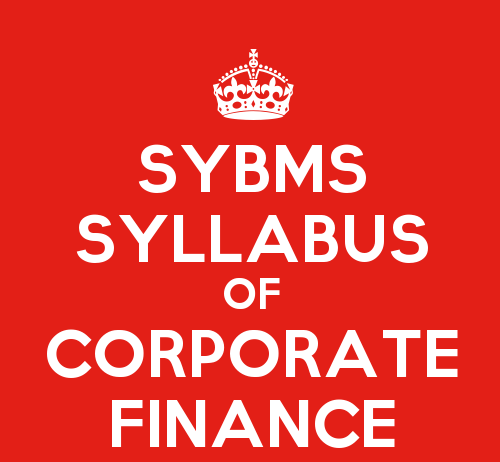Corporate Finance is a subject in SYBMS Semester 3. The subject has 60 lectures and 3 credit. The subject aims to develop a conceptual framework of finance function and to acquaint the participants with the tools, techniques and process of financial management in the realm of financial decision making. Corporate Finance aims at explaining the core concepts of the subject and its importance in managing a business. You will be able to understand the nature, importance, structure of corporate finance related areas and gain knowledge regarding source of finance for a business.
Unit 1- Introduction To Corporate Finance: 14 lectures
Meaning,
Principles of Corporate Finance,
Significance of Corporate Finance,
Amount of Capitalisation,
Over Capitalisation and Under Capitalisation,
Fixed capital and Working Capital funds.
Introduction to ownership securities –
Ordinary Shares,
Reference Shares,
Creditor Ship Securities,
Debtors and Bonds,
Convertible Debentures,
Concept of Private Placement of Securities.
Unit 2- Capital Structure and Leverage: 16 lectures
Introduction to Capital Structure theories,
EBIT – EPS analysis for Capital Structure decision.
Cost of Capital –
Cost of Debt,
Cost of Preference Shares,
Cost of Equity Shares and
Cost of Retained Earnings,
Calculation of Weighted Cost of Capital.
Introduction to concept of Leverage –
Operating Leverage,
Financial Leverage and
Combined Leverage.
Unit 3- Time Value of Money : 15 lectures
Introduction to Time Value of Money –
compounding and
discounting
Introduction to basics of Capital Budgeting
(time value of money based methods) –
NPV and IRR
(Net Present Value and Internal Rate of Return)
Importance of Risk and Return analysis in Corporate Finance
Unit 4- Mobilisation of Funds : 15 lectures
Public deposits and RBI regulations,
Company deposits and SEBI regulations,
Protection of depositors,
RBI and public deposits with NBFC’s.
Foreign capital and collaborations,
Foreign direct Investment (FDI)
Emerging trends in FDI,
Global Depositary Receipts,
Policy development,
Capital flows and
Equity Debt.
Brief introduction & sources of short term Finance Bank Overdraft,
Cash Credit, Factoring
Reference Books:
- Foster, George Financial Statement Analysis, 2nd ed., Pearson Education Pvt Ltd
- Damodaran, A. (2008). Damodaran on Valuation, Security Analysis for Investment and Corporate Finance (2nd ed.). Wiley India Pvt. Ltd.
- Chandra, P. (2011).Corporate Valuation and Value Creation, (1st ed). TMH
- Weston, Chung, Hoag, Mergers, Restructuring and Corporate Control, Prentice Hall Of India.
- M.Y. Khan and P.K. Jain – Financial Management – Tata – McGraw Hill Publishing co. Ltd., New Delhi.
- Prasanna Chandra – Financial Management – Tata – McGraw Hill




158 Comments